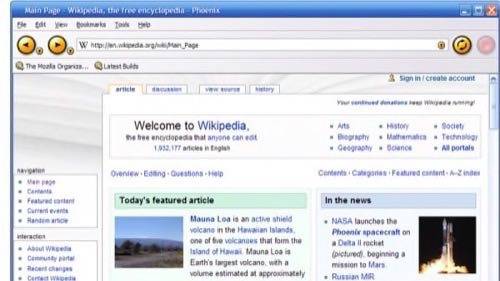
On November 9, 2004, President George W. Bush was still glowing a week after his successful re-election bid and preparing for his second term in the White House. Xbox game Halo 2 had the most successful opening day sales of any video game, topping $125 million.
And the Mozilla Foundation released the first version of the Firefox browser.
Yes, Firefox turns eight years old today. Begat from the ruins of Netscape and the evolution of the Mozilla Navigator browser, Firefox had a very specific aim: topple the near monopoly of Microsoft’s Internet Explorer.
Beginnings: A Simple Mission
In the beginning, though Mozilla did call its browser “Firefox.” The original name (in April 2003) was meant to be Phoenix, but Mozilla ran afoul of Phoenix Technologies, which had a semblance of its own browser at the time. Mozilla then thought it would call the browser “Firebird.” but that did not work either, as the Firebird database server already had the name. Firefox was chosen for its similarity to Firebird, but Mozilla then learned that a group in the United Kingdom owned the trademark to Firefox, which delayed the browser’s release. Mozilla worked out a licensing agreement and Firefox was born.

Firefox was developed as a branch of the open source Mozilla Suite as a cross-platform browser that would work anywhere. Firefox’s original space within the Suite was known as Navigator – next to other features such as Communicator (Mozilla Mail and Newsgroups), IRC chat (ChatZilla) and a webpage developer (Mozilla Composer). It was developed using XUL markup language, which essentially created the market for browser extensions and themes.
After Firefox 1.0, Mozilla released new versions of the browser about once a year (or so) until 2011, when Mozilla went to the “rapid release” schedule, issuing new versions of Firefox every six weeks or so. Firefox for the Web is now on version 16.2, which was released on Oct. 26, 2012.
The core goal of Mozilla through Firefox was to create an open source community that gives developers and consumers a choice in how they want to interact with the Web. Firefox continues to meet that goal.
Firefox was an essential piece in the evolution of the Web. Before there was Google Chrome, before there was iOS Safari, the browser landscape was pretty much Internet Explorer and Firefox. The two diametrically opposed organizations – a closed system with few choices versus an open system with many choices – have defined, in parallel, the evolution of the Web.
The Web is a lot different place in 2012 than it was in 2004. Yet that same open/closed dichotomy still defines how the Web evolves.
Firefox In The Mobile Era
The Mobile Revolution put enormous pressure on organizaions focused specifically on Web browsers. Mozilla looks after many open-source projects, but the bread-and-butter of the non-profit organization has always been Firefox.

As more smartphones reach consumers hands, the less time they spend on the Internet through their PCs and laptops. Smartphones come with default browsers, such as Android’s browser (and Chrome for Android, which will become the default browser for Android in successive releases of the operating system) and Apple’s Mobile Safari. Many other third-party mobile browsers are available (such as Opera and Dolphin) for both iOS and Android, but most smartphone owners stick with the default browser. Unlike the PC world, where installing your preferred browser is one of the first things that people with a new machine, third-party browsers are not yet pervasive on mobile devices.
That could be because unlike on PCs – where the browser is basically the only way to interact with the Web – the browser is not as central to how mobile users interact with the Internet. Native apps, as found through Apple’s App Store or Android’s Google Play, consume as much time for users as do the default browsers. Whereas I might use Firefox to visit The Huffington Post on my computer, I am more likely to use The Huffington Post app on my tablet or smartphone.
The native environments inherent to mobile operating systems belie the open principles that Mozilla was founded on. Hence, Firefox finds itself in a position shared by many Web companies in the Mobile Era: evolve or die.
That is easier said than done. Especially if you want to make a significant impact in how people fundamentally interact with the Web through their mobile devices. Third-party mobile browsers are important to the mobile app landscape because they give users choice, but ultimately the likes of Opera, Dolphin, Skyfire or Miren remain niche options for users with specific tastes.
Sure, Mozilla has released Firefox as a third-party browser for Android. But Mozilla is thinking bigger than just being another third-party browser on some other company’s operating system.
The future of Firefox will be as its own operating system, based on HTML5 and shipped on its own devices. Firefox OS is based on the open source Boot2Gecko project and will be a browser-based mobile operating system built to be optimized towards the Web. ReadWrite has covered Mozilla’s ambitions in mobile extensively in the past. See the stories listed below for context:
- HTML5 Does Have A Mobile Future: Mozilla’s Chris Heilmann Goes Mythbusting
- Mozilla Close To Cracking HTML5 Mobile Hardware Integration for Android
- Firefox For Android Reveals The Future Of The Mobile Web
- Mozilla Putting All The Pieces Together To Be A Smartphone Contender
- Mozilla’s Plan For Keeping Firefox Relevant In A Post-Browser Web
A look back at eight years of Firefox makes it clear while Mozilla challenges have remained constant, but the context has changed. While Google, Apple and Microsoft try to control the user experience through their (mostly) closed native ecosystems, Mozilla wants to bring the Web back as the central user experience in mobile. The first Firefox OS devices are due to ship sometime in 2013 and will initially be focused on foreign markets, such as Latin America.
Mozilla is adapting to the evolution of computing, but it remains to be seen if its new plan will be enough to keep Firefox relevant.
Top image: Phoenix version 0.1, Historical browser images courtesy Wikipedia.










